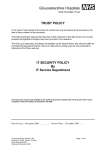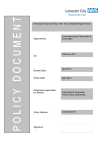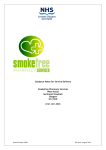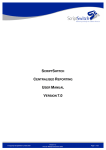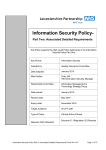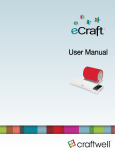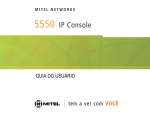Download - Burton Hospitals NHS Foundation Trust
Transcript
POLICY DOCUMENT Burton Hospitals NHS Foundation Trust INFORMATION SECURITY POLICY Approved by: Executive Management Team On: 16 January 2014 Review Date: December 2015 Corporate / Directorate Corporate Clinical / Non Clinical Non Clinical Department Responsible for Review: Information Department Distribution: • Essential Reading for: • All Staff, Health Informatics Service Staff, ICT suppliers and partners Information for: Policy Number: 6 Version Number: 5 Information Security Policy / Version 5 / December 2013 Burton Hospitals NHS Foundation Trust POLICY INDEX SHEET Title: Information Security Policy Original Issue Date: 1996 Date of Last Review: February 2012 Reason for amendment: Periodic review Responsibility: Information Manager Stored: Information Department home drive, Information Security folder Linked Trust Policies: Information Governance Policy Confidentiality Policy User Access Management Policy Records Management Policy Safe Haven Policy Disposal of Surplus / Obsolete / Condemned Equipment Policy Employee Use Of Social Media And Social Networking Policy E & D Impact assessed: EIA 159 Consulted: Information Governance Steering Group, Health Informatics Service Executive Directors Senior Managers Departmental Heads Information Security Policy / Version 5 / December 2013 REVIEW AND AMENDMENT LOG Version Type of change Date Description of Change 3 Review 19/12/2011 Periodic review and update of Version 3 4 Review 23/01/2012 Periodic review and update of Version 4 5 Review 23/12/2013 Amendments regarding use of personal equipment, access to social media sites and general review. Information Security Policy / Version 5 / December 2013 INFORMATION SECURITY POLICY CONTENTS Paragraph Number Subject Page Number 1 Introduction 1 2 Policy Statement 1 3 Coverage and Scope 2 4 Duties and Responsibilities 2 5 Computer Security Policy 3-13 6 Data Protection Act 13-16 7 Training 16 8 Monitoring and Review 16 Information Security Policy / Version 5 / December 2013 BURTON HOSPITALS NHS FOUNDATION TRUST INFORMATION SECURITY POLICY 1. INTRODUCTION Information held within the Trust's manual and computer systems represents a valuable corporate resource on which the organisation is highly dependant for carrying out its day to day activities. Disruption to these systems potentially has a great impact on the ability of the Trust to treat patients. The three main issues are: Confidentiality Information is only accessed by those who "need to know" Integrity Data are valid, complete and fit for purpose Availability The correct information is accessible to the person who needs it at the right time. Due to the rapidly changing nature of Information Technology this Policy will be amended as new threats to security arise. 2. POLICY STATEMENT The purpose of this Policy is to protect information from misuse and to ensure it is available to support the organisation in delivering healthcare. In particular the Trust will ensure that: Data held on its computer systems are secure and confidential. Transfers of data are carried out securely. The Data Protection Act and other relevant legislation are complied with. NHS guidance in this area including the Information Governance framework requirements are implemented. Confidentiality, integrity and availability of data are maintained at all times. There are systems for reviewing, monitoring, and improving security. Joint working with partner organisations maintains and improves security. Employees are made aware of this Policy and its implications. Failure to comply with this Policy may be dealt with under the Trust’s disciplinary procedures. Information Security Policy / Version 5 / December 2013 1 3. COVERAGE AND SCOPE This Policy applies to all Trust employees whether working on or off site and other users of the Trust’s information systems including contractors. In addition the Policy is applicable to all Trust owned computer systems, externally provided systems where the Trust has local responsibilities, and employee owned devices authorised for use on Trust business. 4. DUTIES AND RESPONSIBILITIES Security must be the responsibility of all employees in the organisation rather than being confined to a few specialists. The specific duties at each level are detailed below. The Executive Director with responsibility for Information Security is the Director of Finance who is also the Trust’s designated Senior Information Risk Officer (SIRO). Day to day management responsibility is delegated to the Information Manager. The SIRO will ensure that the Board of Directors is briefed on Information Security issues, develop an Information Risk Management Programme and provide an annual risk assessment for the Annual Governance Statement . The Information Manager is the designated Trust officer for Information Security and Data Protection and will support the SIRO and other key Trust staff e.g. Caldicott Guardian in such matters. They will also be responsible for the implementation of the Information Risk Management Programme. The SIRO or Information Manager will chair the Information Governance Steering Group which is charged with overseeing the Information Security arrangements in the Trust including the review and implementation of this Policy. The IT Project Manager will be responsible for approving applications for mobile computing and remote access. They will keep records of approvals and a list of equipment issued. Departmental managers are responsible for ensuring that all staff have been properly trained to use computer systems and that this Policy is complied with. In addition it is essential that they promptly notify Human Resources of new starters and leavers. Computer system managers (also known as Information Asset Administrators) have a key role in ensuring security and confidentiality and should note their particular responsibilities - see section 6.5 System Managers. Where a departmental system does not have a designated system manager then this role will be assumed to be the responsibility of the Head of Department. All employees have a personal responsibility to comply with this Policy; failure to do so may lead to disciplinary action. Information Security Policy / Version 5 / December 2013 2 5. COMPUTER SECURITY POLICY 5.1 Individual Passwords Access to Trust computer systems is protected by password. These may be system generated (e.g. Meditech) or chosen by the user. If the latter, the password must be at least 6 characters long and a mix of numbers and letters. The chosen password must not be something that can be easily associated with the user. Passwords must not be disclosed to any other person and should not be written down or displayed on or near computer equipment. Do not write any passwords down unless concealed, disguised, or encrypted. The use of another person's password is forbidden. If you think your password has become known by another person, notify your superior and get it changed immediately. The MS Windows screensaver must be password enabled. The timing frequency should be appropriate to the risk - i.e. a maximum of five minutes. If you require assistance please contact the Health Informatics Service (HIS) Service Desk on Ext 5282 or via email on [email protected], or via the HIS Service Desk Portal on the Trust Intranet homepage. It is essential that password access is removed from Staff who leave the Trust; please ensure that the correct procedure is followed (See ESR Manager Self Service Manual v 1.12 on the HR Intranet site). 5.2 Misuse of Computer Resources The use of the Trust's computer equipment for purposes not connected with the work of the Trust is not allowed. Only persons authorised by Management may use the Trust's computer equipment. The storing of personal files on Trust equipment, e.g. images, music files etc is not permitted. Deliberate unauthorised access to, copying of, alteration or deletion of programs and data will be regarded as a breach of this Policy and may be dealt with under the Trust's disciplinary procedures. 5.3 Reporting of Security Incidents It is essential that all suspected or actual breaches of computer security are reported promptly. Information Security Policy / Version 5 / December 2013 3 A breach of computer security is defined as any action or incident which has caused, or could result in, the wilful or accidental unauthorised access, disclosure, alteration, corruption or deletion of any data held on or produced by a computer which relates to a patient, a member of staff or the commercial activities of the Trust and its purchasers and suppliers. Examples of security incidents include: The disclosure or loss of confidential information* Your password becoming known to someone else Virus infection of a computer or media e.g. CD Unauthorised access to or use of information A security breach leaves both the Trust and individual liable to prosecution under the Data Protection Act and Computer Misuse Act. The incident should be reported to your immediate supervisor and the HIS Service Desk on Ext 5282 or via email on [email protected]. In cases where it is your supervisor that is suspected then report it to the manager above. The incident will be investigated by the HIS security manager who will keep Trust personnel appropriately informed. There is an escalation procedure to involve more senior staff in serious cases. A log of incidents is kept by the HIS on behalf of the Trust. This is reviewed periodically to establish whether security measures need to be improved. All staff are individually responsible for reporting security incidents. NB Incidents also need to be recorded on the Safeguard system. *Disclosures involving manual patient records e.g. case notes should be reported to the Health Records Manager on 5466 as well as your Line Manager (See "Unauthorised Disclosure of Manual Records"). 5.4 Physical Security All employees should ensure that the following security measures are applied and observed within their respective Wards and Departments etc. PCs should be sited as to avoid the possibility of confidential information being seen by unauthorised persons. PCs should be logged-off when left unattended. This will ensure that confidentiality and access controls are properly maintained. Failure to log-off from systems when unattended may provide other users with additional computing facilities than would normally be allowed. Where PCs are provided with security devices (e.g. security locks etc), these should be used to secure the equipment from unauthorised use or theft. Mobile devices e.g. Laptops, Tablets etc must be securely locked away when not in constant use (e.g. overnight, at weekends etc). Information Security Policy / Version 5 / December 2013 4 Trust provided encrypted memory sticks must be used to store Trust data, the use of personally owned memory sticks is forbidden. Trust owned memory sticks must be kept securely at all times. 5.5 Computer Printout Carefully consider whether you need a hard copy of the information before printing out. Reducing printed material will lower the chances of confidentiality breaches. Computer printout shall only be released to authorised staff. Output shall not be retained for longer than it is required, but should be retained for the minimum period as defined by law. Waste printout must be disposed of with due regard to the sensitivity of the information it contains. Confidential information must be disposed of securely, eg shredded. 5.6 Mobile Computing and Remote Access Due to the nature of their role some Trust staff need mobile computing equipment and/or the requirement to connect to Trust computing facilities from remote locations. This has increased security risks and special arrangements need to be in put in place. These apply to users of Laptops, iPads, tablets, Smart Phones, Blackberries, and any user connecting via the Remote Access Service (RAS). The Trust will provide secure access to email/calendar/contact data for Trust staff from personal portable devices, such as Smartphones, iPads, and tablets. Access must be individually applied for and authorised. The connection of non authorised personal devices to the Trust’s computing facilities is forbidden. All applications for mobile and remote access services must be made to the IT Project Manager. Please email [email protected] Users must comply with the Mobile Computing and Remote Access Procedures which are issued to them as part of the application process. The user should treat the remote connection with the same consideration that would be given to an on site PC. Remote connection must only be made via a Trust authorised device. The Information Security Policy must be complied with when using remote services or mobile equipment. Patient/person identifiable data must not be saved or downloaded to the remote/mobile device hard disk or other media e.g. CD, Memory Stick, or printed out. Information Security Policy / Version 5 / December 2013 5 Concurrent connection to the Trust network and any other network e.g. the Internet is not permitted. 5.7 Assessment of New Systems It is essential that all new systems are assessed for compliance with Data Protection and Information Security standards. This applies to any computer system including those provided free of charge e.g. as part of a national initiative. It also includes remote systems accessed via Internet web links. The assessment usually takes place as part of the implementation process but if you think it has been missed please contact the Information Manager via email or on ext 5686. 5.8 Internet User Policy Whilst the Internet enables rapid communication and access to information it also exposes the Trust to greatly increased security risks. These include unauthorised access to information, virus attack, and hacking. The Trust has secure access to the Internet via the NHSNet gateway for accessing information and for Email (see also Email User Policy). Connection to the main Trust network and the Internet (other than via NHSNet) at the same time is forbidden. During normal working hours Internet access is permitted only for a work related purpose. However personal access via NHSNet is permitted before or after work, or during lunch times. The downloading of multimedia and MP3 files for personal use is not permitted. The accessing of material of an inappropriate nature is forbidden. This includes but is not limited to material that is indecent, obscene, sexist, racist, or pornographic, or which may cause offence. In addition, use must not contravene the Computer Misuse Act 1990, specifically, hacking is not permitted. Please note that use of social media sites eg Twitter, FaceBook etc is governed by the Employee Use Of Social Media And Social Networking Policy. Users must ensure that the use of information obtained via the Internet complies with copyright law. Internet usage is monitored centrally by individual user in order to protect the Trust’s computing resources and to ensure compliance with legislation and NHS policy. Confidential information must not be passed via the Internet. Internet usage is subject to ongoing review and further restrictions may be imposed to protect the Trust’s computing resources, reputation, or to comply with NHS mandate or legislation. Information Security Policy / Version 5 / December 2013 6 Failure to comply with this Policy may be dealt with under the Trust's Disciplinary procedures. 5.9 Email User Policy In order to perform their duties Trust staff are given access to Email via a centrally managed service. Along with the benefits this brings it is recognised that there are increased security risks. Confidential information regarding patients and staff must not be sent externally via Email unless encrypted. The NHS.net email service is the only secure method for external email as messages and attachments are automatically encrypted. However it is essential that both the sending and receiving accounts are of this type. To request an NHS.net account please contact the HIS Service Desk on Ext 5282 or via email on [email protected]. Users need to note that statements made in Emails must be factual and truthful and do not contain, for example, inaccurate gossip. Where incorrect statements are made about individuals and companies, the Trust is potentially liable. The sending of inappropriate material by Email is forbidden. This includes but is not limited to material that is indecent, obscene, sexist, racist, or pornographic. Email usage must comply with the Data Protection Act - please see relevant section of the Information Security Policy. Care needs to be taken when addressing messages as it is easy when using distribution groups to circulate an Email more widely than intended. Users must ensure that information circulated via Email complies with copyright law. The use of Web based Email e.g. "hotmail" is not permitted for work related purposes. Copies of Emails sent by the Trust central service are stored on the Email server for backup purposes. Do not open attachments unless you are sure they are bona fide. The sending of Email for personal rather than business use is not permitted. The use of the service will be monitored by individual user to ensure compliance with this Policy. Email access may be removed from anyone abusing it. Should the Trust incur charges due to inappropriate use these will be recharged to the individual user. The above applies equally to all electronic messaging systems used by Trust personnel. Information Security Policy / Version 5 / December 2013 7 5.10 Computer Viruses Viruses are usually spread via Email or the Internet but can also be carried on disks or CDs being passed around users of different PCs. Computer games and "demonstration" disks/CDs are also a common source of infection. A PC is usually infected by opening a virus infected file within an Email or on a disk/CD. The Trust has software installed on its computer systems which regularly check for viruses. In order to reduce the risk of virus infection the following should be observed. Take care when opening Email with attachments. Check that you know who the sender is and that the subject/title is meaningful. Even if you know the sender it may still carry a virus. If in doubt do not open the Email and ring the HIS Service Desk on 5282. All "incoming" disks/CDs, including disks from other NHS Organisations, demonstration disks and new software packages should be checked for viruses before they are used. Only games supplied as part of the Microsoft Operating System are permitted to be installed on Trust PCs. The introduction of unauthorised Computer software will be considered as misuse of the Trust's Computer resources and may be dealt with under the Trust's disciplinary procedures. It is essential that the anti virus software is updated regularly so that the latest viruses can be detected. This should be done automatically via the network. If you suspect that your software has not been updated then please ring the HIS Service Desk on 5282. If you detect a virus you MUST report it to the HIS Service Desk on Ext. 5282. They will be able to advise on what action to take and will record the incident in the Computer Security Log. 5.11 Backing up data Your data must be regularly backed up. Data stored on the network servers will be automatically backed up by the HIS each night. Trust PCs are set up to save data by default on a network drive rather than the “C” drive. If you suspect this is not the case or there are other problems please contact the HIS Service Desk on Ext 5282 or via email on [email protected]. It is the individual user's responsibility to ensure that data are backed up by saving it on a network drive. It is no longer necessary to back up your own data but any historical files must be kept securely and disposed of safely when no longer required. Information Security Policy / Version 5 / December 2013 8 When working on spreadsheets, documents etc ensure that you save the files at regular intervals. 5.12 Portable Computers Portable Computers (e.g. Laptop and Notebook PCs) are increasing in use by Trust employees especially where there is a requirement to work at more than one location e.g. office and home. For these users there are some specific security measures that need to be complied with as follows. The equipment must be encrypted. It is only to be taken off site if authorised by your Line Manager. You are responsible for the equipment whilst it is in your possession. Do not take person (e.g. patient, employee) identifiable data off site. The equipment must be kept securely when not in use. Do not leave it on view e.g. in a car, or near ground floor windows. Use any security measures provided e.g. locking cables. Back up any data kept on the hard disk to a network drive It is essential that any reported promptly. See Trust network from off section of this Policy Procedures. 5.13 security problems e.g. loss, theft, virus infection, are “Reporting Security Incidents”. Users connected to the site also need to comply with the “Remote Access” and the Mobile Computing and Remote Access Security Lock away any computer equipment where practical. Use security locks if provided. Equipment should not be removed from the Trust's premises without prior approval. Personal data should not be left displayed on the screen when the PC is left unattended (i.e. always log out). Keep CD’s, encrypted memory sticks etc locked away when not in use. Always log off when you have finished your session on the PC. This will ensure that other users do not gain access to any facilities or files available only to yourself. 5.14 Personal Digital Assistants (PDA) PDAs' are used in the Trust for storing data electronically, most commonly for personal diaries. Information Security Policy / Version 5 / December 2013 9 Only Trust owned PDA's may be used for work purposes and connected to the hospital network. It is essential that the PDA is not used to store sensitive or confidential data, especially that which identifies a patient. Due to the device's vulnerability to loss or theft every effort should be made to ensure the PDA is kept securely both on and off site. The user should ensure that any security devices available on the PDA are implemented, e.g. password protection, encryption. The PDA can be connected to a Trust PC to transfer data, for example to update a diary. Special care should be taken to ensure that only the intended data is transmitted. It is recommended that data transfer is via parallel port and cradle rather than Infra Red. It is essential that the antivirus software on the host PC is working correctly and up to date before proceeding with data transfer. It is important that the user backs up any data to a network drive and makes contingency arrangements for the PDA should it become lost/stolen* or unavailable for use. Once they have reached the end of their useful life Trust PDAs should be disposed of by following the PC Disposal Policy. * Please report promptly any lost/stolen PDA's to the HIS Service Desk on ext 5282. 5.15 Buying Hardware and Software All purchases of Hardware and Software have to be approved centrally. This is to ensure: It is suitable for its intended purpose Compliance with Trust and NHS Standards Where possible Hardware/Software is standardised Compatibility with the Trust's Information Strategy It is Trust policy to buy DELL PCs in all but exceptional circumstances. To order new equipment please contact the HIS Service Desk on Ext 5282 or via email on [email protected]. NB Supplies are instructed not to order computer equipment unless authorised. Information Security Policy / Version 5 / December 2013 10 5.16 Transfer of Computer Equipment within the Trust Users are not authorised to move fixed equipment, e.g. PCs and printers. Please ensure that the following are carried out when transferring equipment: Inform the HIS Service Desk on Ext 5282 or via email on [email protected] that the equipment is to be moved. A HIS engineer will attend the new location where the transferred equipment is to be installed. The HIS will update the Trust’s Asset Register. No data should be stored on the PC Hard Disk; however if any data needs to be removed the HIS engineer will advise the user of the process to be followed. If software is to be transferred with the PC then the relevant licence, program disks and manuals should be also passed on. If the software licence is to be retained then the program should be removed from the Hard Disk before transfer. If the equipment is to be permanently disposed of please see "Disposal of PCs" section below. The HIS Service Desk will be able to assist with technical advice where required. If you have any general queries, please contact the Information Manager on Ext 5686. 5.17 Disposal of PCs A PC may be permanently disposed of when it has reached the end of its useful life. Reasons for this may include: The equipment is faulty and beyond economical repair Specification is no longer adequate Incompatibility with other equipment The HIS need to confirm that a PC needs to be disposed of and will inform users of the information required to be noted on the disposal certificate. Please contact the HIS Service Desk on Ext 5282 or via email on [email protected]. The HIS will update the Trust’s Asset register of the disposal. All equipment must be disposed of in line with the Trust's Disposal Policy - see Trust Intranet, Non Clinical Policies, Disposal of Surplus/ Obsolete/Condemned Equipment Policy. Information Security Policy / Version 5 / December 2013 11 No data should be stored on the PC Hard Disk; however if any data needs to be removed the HIS engineer will be able to assist the user. The Estates and Facilities department has an arrangement with a specialist contractor for the safe disposal of PCs in line with EU regulations. 5.18 Portable Memory Sticks Portable memory sticks plug into the USB port on a PC and can be used to store large amounts of data which together with their small physical size brings certain risks. The following measures must be taken. Only Trust owned and configured sticks are to be used. Do not use them to store confidential data. Ensure all data is removed from the stick before disposing of it. Store memory sticks securely when not in use. Do not rely on them to back up critical systems. Trust supplied memory sticks are centrally managed and meet NHS encryption standards. Use of any other USB storage devices is prohibited and may result in disciplinary action. Please contact the IT Projects Manager to apply for a memory stick. Please email [email protected] 5.19 Software Copyright The Trust licenses the use of computer software from the software suppliers. It is not owned by the Trust, and cannot be reproduced without authorisation from the software developer. Any copying of software without the copyright owner’s permission is an infringement of the copyright law. The Federation Against Software Theft (FAST) is an association dedicated to tackling breaches of copyright. They have the right to come into organisations to check the law is being complied with. If you are using illegal software, you are personally liable for the breach in addition to the Trust. Any employee found copying software, other than for legitimate backup purposes may be dealt with under the Trust's disciplinary procedures. If you need to use software licensed by the Trust at home for work purposes, you must be sure that the licence for the program permits home use. 5.20 General Precautions Do not locate PC’s close to heat and water, e.g. radiators, pipes etc. Cables should be kept tidy and away from walkways. Do not allow drinks near to, or place plants on top of computer equipment. Paper must not be stored on or near to equipment due to risk of fire. Information Security Policy / Version 5 / December 2013 12 Do not position PC screens where unauthorised persons can see personal information. Always exit from applications and shut down the PC properly. In order to save energy please turn off computer equipment whenever it is not going to be used for long periods (i.e. overnight and weekends). 6. DATA PROTECTION ACT 6.1 Introduction The Data Protection Act 1998 applies to MANUAL as well as computer records and affects all staff across the Trust who have access to information about patients, staff, or other individuals. The Act obliges the Trust to provide a brief description of this data, including uses, sources and disclosures to the Office of the Information Commissioner. Hospital personnel should contact the Trust's Data Protection Officer on 5686 if they have any queries. Data users must follow eight internationally accepted "Data Protection Principles" on which the Act is based, and which together define a code for personal data. To ensure compliance, the Act establishes criminal offences if these responsibilities are neglected. If unsure about your responsibilities, seek advice from the Data Protection Officer on 5686. 6.2 The Data Protection Act 1998 Principles The Act specifies eight principles of good practice that must be complied with by users of personal data. Personal data is any information held manually or on computer that relates to a living individual. 1. "Personal data shall be processed fairly and lawfully". The common law duty of confidentiality must be complied with. The person must not be misled into giving the data and will be told who will use the data and for what purpose(s). 2. "Personal data shall be obtained only for one or more specified and lawful purposes, and shall not be further processed in any manner incompatible with that purpose or those purposes". Information obtained for one purpose cannot be used for another purpose without consent, unless there is an overriding public interest. 3. "Personal data shall be adequate, relevant and not excessive in relation to the purpose or purposes for which they are processed". Information Security Policy / Version 5 / December 2013 13 Depending on the particular situation there may be Health Service and/or professional guidelines regarding the taking and making of records that must be followed. 4. "Personal data shall be accurate and, where necessary, kept up to date". The data must be correct, complete and timely. 5. "Personal data processed for any purpose(s) shall not be kept for longer than is necessary". Certain types of record must be kept for a minimum period laid down by law or NHS guideline. 6. "Personal data shall be processed in accordance with the rights of data subjects under this Act". These include the right of access to the information. 7. "Appropriate technical and organisational measures shall be taken against unauthorised or unlawful processing of personal data and against accidental loss or destruction of, or damage to, personal data". The information must be protected by security measures. 8. "Personal data shall not be transferred to a country or territory outside the European Economic Area (unless that country or territory ensures an adequate level of protection for the rights and freedoms of data subjects in relation to the processing of personal data". The data must not be sent outside Europe unless adequate controls are in place. 6.3 Access To Personal Data An individual person is entitled to ask to see what information is held about them on computer and manual records. This right is subject to certain terms and conditions being met. It is an offence to refuse a valid request for access. The request must be dealt with within 40 days of receipt. Requests for access are dealt with by the following: Health Records Manager on Ext 5466 - for patient information enquiries. Employee Services Manager on Ext 5710 - for payroll/personnel information. If the above are not applicable then please contact the Legal Services Manager on Ext 5929. Information Security Policy / Version 5 / December 2013 14 Do not attempt to answer the request yourself, ensure it is passed on to the appropriate contact point. 6.4 Individuals' Rights The Act gives seven rights to individuals in respect of their own personal data held by others. They are: Right to access the data Right to prevent processing likely to cause damage or distress Right to prevent processing for the purposes of direct marketing Rights in relation to automated decision taking Right to take action for compensation if the individual suffers damage Right to take action to rectify, block, erase or destroy inaccurate data Right to request an investigation as to whether any part of the Act has been contravened. If you have any queries or concerns please contact the Data Protection Officer on 5686. 6.5 System Managers We are required to identify a responsible person for each system in the Trust. This role is designated as a "Data Custodian" under the Data Protection Act but is also known as an Information Asset Administrator. This individual has responsibility for: System security Ensuring access is restricted to authorised users Notifying the Data Protection Officer of significant changes to data held Ensuring systems are used in accordance with relevant policy and procedures For corporate systems (e.g. Meditech) security controls are mainly centrally administered, although there are some local responsibilities. Where a System Manger has not been identified this role will be the responsibility of the Head of Department. 6.6 Unauthorised Disclosure of Manual Patient Records It is essential that all disclosures of confidential manual patient records are reported promptly. Examples of unauthorised disclosure are lost case notes. Information Security Policy / Version 5 / December 2013 15 The incident should be reported to your immediate supervisor and the Health Records Manager on extension 5466. In cases where it is your supervisor that is suspected then report it to the manager above. The incident will be investigated by the Medical Records Manager. There is an escalation procedure to involve more senior staff in serious cases. A log of incidents is kept, and is reviewed periodically to establish whether security measures need to be improved. All staff are individually responsible for reporting such incidents. 7. TRAINING For good Information Security it is essential that computer users are sufficiently trained so that they are aware of the risks to systems and the security measures available. Information Security training is incorporated within the wider Information Governance Training Programme. General courses are available for all staff both on line via E Learning and in classroom based sessions. It is the responsibility of Supervisors / Departmental Heads to ensure users are trained. 8. MONITORING AND REVIEW Both compliance with and effectiveness of this Policy will be monitored by the Information Governance Steering Group on an ongoing basis. This will include a review of security incidents to determine whether further controls including policy change are required. Periodic reviews will be carried out by Internal Audit. Information Security Policy / Version 5 / December 2013 16




















